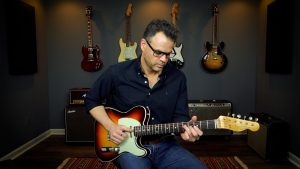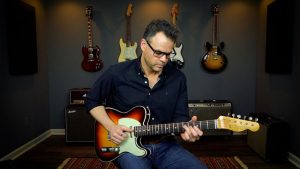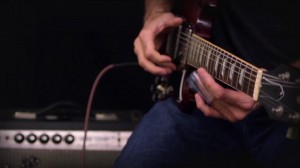This is a very simple lesson, but one of the hardest to put into use. It is probably what separates a really great blues solo from the average one.
For example, when you are having a conversation with someone and you would like to illustrate your point with a story, do you immediately give away the ending right away? Not if you’re a good storyteller.
You will ease them into the story with something to get them interested. Then you build the story up, and up, and up until you finally finish with the climactic ending. Now imagine if the story just started with the climactic ending. It probably wouldn’t be that impressive.
Jaws
You see it’s the build up of the story that makes the ending so climactic!! You’ll find this in every great movie ever made.
What if Jaws started with a guy on a boat, and then he killed the shark. It wouldn’t be as good, because you don’t have the back story as well as what caused the strife between the two main characters.
This is the same idea to keep in mind when improvising blues guitar solos. Everyone loves the ending of the solo when the guitarist is pulling all the punches to bring together the climactic ending.
The truth is, without the buildup of all the licks before the climactic last 12 bars, the ending wouldn’t be near as great.
A great solo requires a back story for it to come together as a powerful solo and not just to show off all your chops. You’ll usually hear people applaud when the solo is in the climactic ending, but rarely will you hear massive applause when the solo is in the beginning form. And for good reason. This is what I have always paid attention to. Not the ending so much, but how they built it up. If you can build it up, it’s much easier to finish strong. All you have to do at the end is play a lot of sustaining notes, occasional fast runs, and hit the strings with a passion like your life depended upon it. :)
Listen and Learn
The problem is how to get the listener interested in your solo’s back story. I find this one of the hardest things to do. Derek Trucks, Eric Clapton, SRV, Duane Allman, and BB King were masters at this. Study this. This information is worth its weight in gold!
One of the hardest things to learn is restraint. Be patient! You can’t push the solo, you have to let it come together and sound natural. One thing that helps me is to stop thinking and remember to not look at the fretboard as much. Don’t think scales! Think feel.
Scales are For Practice, Not Performance
Start telling a story with your blues guitar solos. I promise you people will pay a lot more attention if you do.
For in-depth blues guitar training please check out the All Access Pass.
Are you doing this? Post a comment below about what your experience has been.




John,
Really liked the Blue Sky solo. Any plans on doing Dickey Bett’s style lesson? If so, will it be released soon?
Thanks,
Mark
Yes I’m working on it right now. Hopefully it will be done soon.
Thanks!
never thought about like that.My prob is that i have old/bad habits when it comes to the fretboard.this have given me thought of how i go about it.great blog.
Thanks!
No, but from now on I will be working on it.
I’ve always known there is something wrong or missing from my solos and you have just pointed it out. On a good day my solo may sound OK but but it did not build, just wandered around lost, going up and down with intensity without a destination or telling a story. I think about the build when I listen to songs but have never thought about the same thing applying to solos. Thanks John for helping this wanker climb one more step out of the rut……: )
Yes it’s amazing how much you will start to notice it now in your favorite solos. Thanks!
During my many years of playing a couple of instruments I have run into many musical related problems, one of which is not being able to hear certain things in a song that I am trying to learn how to play by ear. If you have ever sat down and tried to figure out an instrument’s part note for note (or chord for chord), you’ve learned how challenging it is. But thanks to technology to slow down music and my favorite one is the Song surgeon which has an distortion-free audio even if you slow it down. This software has a lot of features best for people starting to play and for those who have been playing instruments.
John, yeah you are right especially with slide, your guitar starts to talk… telling a story. My problem is my guitar hasn’t learned any of the vowels yet…
Vowels on the guitar I would think are intervals. If you only know scales and not intervals or chord tones, you won’t have much interesting things to say. Thanks for the comment!
John I like that thought. It’s on line with what I’ve been thinking lately with keys, scales, chords and chord formation.
Guess I’m not too far of in study.
Thanks!
Guitar telling a story? I was listening to Eric Clapton last night, his 24 nights CD “Edge of Darkness”. Perfect example of what you are talking about John.
Hey John, fortunately for me this is a natural talent for me. I’ve spent a great deal of my time with Improvisation,which gives me the freedom to tell the story. For example; using your ‘G blues scale solo’, I’ll go through the first twelve bars and after resolving I’ll use the intro and perhaps use use a few more of the riffs involved in the piece, however, I’m looking to build the intensity of the piece -enter improv – what do with that varies but always staying within the context of the original and always coming back to the intro.For me, the intro puts emphasis on the expression of the piece and depending on how I feel when I come back around, is how I’ll play the intro riff, i.e… with my bare fingers, with the pick, clean, high gain etc.(I try different things)
I also find myself using this ‘climatic technique’ within the riffs themselves and as the I said, it depends on how I feel and what I did in the twelve bars preceding. It seems to me that from the time one begins to learn the piece that this process of intensity and climax has already began. From the awkwardness of finger position through the hours of searching for the tone, listening over and over, running the same riffs over and over, tends to build tension and the mind as well as the body seeks an outlet. I’ve heard this sort of thing referred to as an ‘Freudian response’, and if one thinks about it there certainly is a link. The Blues is about pain and from my perspective it takes pain to be a good bluesman. thanks for reading…Peace ,Johnny
That’s great! Thanks for the comment. Storytelling is an art in itself. JJ Abrams I think is a genius. Check out his view on storytelling.
http://www.ted.com/talks/j_j_abrams_mystery_box.html
John, in any given key the songs are based on chords I, IV &V. The chords can be played in any single position or up the fretboard adding flavor to the music. So, if I want to change keys I base the key change on one of the chords, I, IV or V?
For example key of G, chords G,C & D… can change keys to C or D coming back to G?
Hope I made sense…
Hey Bruce, my names johnny and what you’re trying to do, if I understand you correctly, is called – Transposing. The key that you start in is the ‘root’. So, the key of G is as you said GAC, 1,4,5. That is based on a major scale, so, G,A,B,C,D,E,F#,G=1,2,3,4,,5,6,7,8 -(8 being the octave). If you want to change ‘Key’, i.e., Key of D -D major scale= D,E,F#,G,A,B,C#,D =1,2,3,4,5,6,7,8, so a 1,4,5 blues progression in the key of ‘D’ =D,G,A. Key of E= E,F#,G#,A,B,C#,D#, E, 1,4,5,=E,A,B
You can play any progression in any key by following this procedure.
Take note that this is a standard 12 bar blues progression. It is always played in that progression; if you ‘invert’ any of the chords,i.e., G,D,C instead of G.C,D it will not work…peace…johnny
Great post! I think you are right, the hardest thing to learn is restraint. Just cuz you can doesn’t mean you should. And don’t forget to breathe!
John, man you hit the nail on the head in this article.
I too am a jazz guitarist and you have portrayed in this post exactly what needs to be done to create that “story” when playing the music, especially jazz.
It’s all in the smooth rhythym in the beginning, bringing the audience “in” and basically putting them in the “trance” of your story, building it up to that climactic
ending and that is exactly what you explain so very well here.
I also teach guitar lessons and it is so important that the student understand this concept, for it is not just strumming some notes, it is a story, portrayed by the music, that will win the audience over.
Great article I will be back to see what you are up to again soon!
This is great dude! Very helpful.
Awesome blog, some very useful tips, thanks
Telling a story is the only way to play the blues. I agree that you need to be patient and let the story come together, but on the other hand you have to be careful not to let it get away on you. If you do you’ll lose your audience before you reach the end. I agree that if you feel the music or “think feel” as you put it and couple that with patience and emotion you can create a blues solo that rocks the house.
I think the whole point of music is to tell a story and the blues sound is the perfect accompaniment.
Yes, I have always noticed this about the great players and the pros. I think I am years away from doing this on my own. I have your awesome slow blues solo in B; it does just that. I’m hoping that by starting with a canned solo, I can branch out from there. My own solos now are just wanking riffs on the scales; pretty much just playing up and down the scales. I dream of the day that I can truly improvise even a decent one on my own. Thanks John for your lessons!
Hey man, great article. This is one of the most obvious but overlooked aspects of playing great solos. It is all about the story, tension, release and emotion. Thinking like a songwriter or storyteller definitely gives any soloist an edge. It’s so easy to get into a “chops” mentality. I’ve always had the best results learning great solos note for note helps as it really works this aspect into the subconscious mind so that it just starts to come out naturally.
I teach guitar lessons in San Francisco and I completely agree with you. There are people who can play fast or difficult things, but if it has no contrast, contour, or phrasing, it becomes boring within seconds. I think the “telling a story” metaphor is great, because songs tend to be very similarly structured, and a constant give-and-take between tension and resolve, comfortable/expected and new/surprising. Love this post, very well put.
Thanks Jeff!